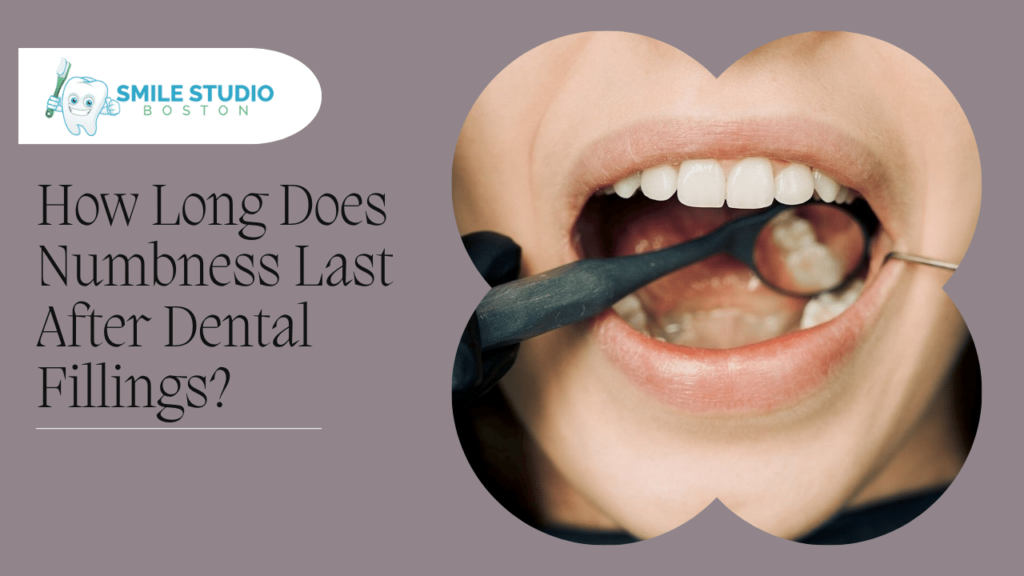Dental procedures, a common part of healthcare in Boston, often leave patients wondering, “How long does numbness last after dental fillings?” This query reflects a widespread experience shared by many following routine dental care. Local anesthetics, used to ensure comfort during procedures like fillings, temporarily numb the treated area. Their usage is a pivotal aspect of modern dentistry, allowing for pain-free treatments. Understanding the duration and effects of such numbness not only eases patient concerns but also highlights the advancements in dental healthcare practices. This blog delves into the typical numbness duration after dental fillings, aiming to provide clear, factual insights for those in Boston and beyond.
Understanding Dental Numbness
To comprehensively understand “How long does numbness last after dental fillings?” one must delve into how local anesthetics function in dental procedures. These anesthetics are specifically designed to temporarily block nerve signals in the area being treated. This action is crucial for ensuring that patients undergo a pain-free experience during dental treatments such as fillings. The duration of the numbness experienced post-procedure varies significantly. It is influenced by various factors, including the specific type of anesthetic used, the amount that is administered, and individual patient characteristics like metabolic rate and overall health.
For individuals in Boston seeking dental care, this information is essential. It helps in setting appropriate expectations regarding the numbness duration after dental fillings and in preparing mentally and physically for the procedure and the subsequent recovery period. Understanding these factors in detail not only aids in managing post-treatment recovery more effectively but also assists in mitigating any anxiety related to the dental procedure, ensuring a more comfortable and informed experience.
Typical Duration of Numbness After Fillings
To comprehensively address “How long does numbness last after dental fillings?” it’s essential to understand that numbness duration can vary significantly. Typically, numbness lasts between one and a few hours, influenced heavily by the type of anesthetic used. Some anesthetics are designed to have longer-lasting effects than others. Furthermore, the specific location of the dental filling plays a crucial role, with areas with denser nerve networks often experiencing extended periods of numbness.
In comparison, other dental procedures, such as tooth extractions or more invasive surgeries, may involve different types or amounts of anesthetics, leading to potentially longer numbness periods. These differences underscore the importance of having an informed discussion with your dentist regarding what to expect in terms of numbness duration for various dental treatments. Understanding these variations is key for patients to manage their post-procedure expectations and recovery effectively.
Managing Numbness and Safety Measures
To effectively manage numbness after dental fillings, it’s important to consider a comprehensive set of safety measures:
- Avoid Chewing on the Numb Side: One of the most critical precautions is to avoid chewing on the side of your mouth that’s numb. This simple step can prevent accidental biting of your cheek or tongue, which can be not only painful but also cause unnecessary discomfort and potential injury.
- Caution with Hot Foods and Beverages: When you’re experiencing numbness due to dental fillings, your ability to sense temperature differences is significantly reduced. As a result, there’s an increased risk of burns from consuming hot foods or beverages. To avoid such accidents, it’s advisable to steer clear of hot items until the numbness fully subsides. This precautionary measure ensures that you don’t inadvertently injure yourself during this period.
- Rest and Limit Fine Motor Skills Activities: Navigating tasks that require precision and fine motor skills can be challenging while you’re numb. It’s important to recognize that your ability to control your mouth and perform delicate tasks may be compromised. Therefore, it’s recommended to take a break from activities that fall into this category until the effects of the anesthetic have completely worn off. This can help prevent accidents and ensure a smoother recovery process.
- Understanding Numbness Duration: Understanding “How long does numbness last after dental fillings?” is essential for managing expectations and planning your recovery effectively. Numbness duration can vary from person to person and even between dental procedures. Some factors that influence it include the type and amount of anesthetic used, the specific location of the dental filling, and individual patient factors like metabolism and overall health. Having a clear understanding of what to expect in terms of numbness duration can alleviate concerns and ensure that you’re prepared for your post-filling recovery.
These safety measures go beyond mere comfort; they are critical in preventing unintentional injuries while you’re still experiencing numbness. By following these precautions, you can ensure a safe and comfortable recovery period after your dental fillings, allowing you to focus on healing and returning to your regular routine with confidence.
When Numbness Might Indicate a Problem
It’s natural to be curious about “How long does numbness last after dental fillings?” However, it’s essential to distinguish between the expected and normal numbness and signs that could potentially point to complications.
Typically, after a dental filling, you can expect the numbness to gradually subside within a few hours. This is part of the standard post-filling experience. During this period, the local anesthetic used during the procedure continues to have its effect, ensuring that you don’t feel any discomfort or pain in the treated area.
But what if the numbness persists significantly longer than this standard duration? This is where awareness becomes crucial. Prolonged numbness, especially when it’s accompanied by other concerning symptoms like severe and persistent pain, noticeable swelling, or the development of a rash, could be indicative of an issue that requires attention.
There are two common culprits for extended numbness. First, it’s possible to have a reaction to the anesthesia used during the dental procedure. While such reactions are relatively rare, they can lead to prolonged numbness and might be accompanied by other discomforts. Secondly, an underlying infection in the treated area can also cause numbness to persist. In this case, it’s usually accompanied by pain, noticeable swelling, and other signs of inflammation.
In situations where prolonged numbness and these accompanying symptoms arise, it’s crucial not to ignore them. An immediate consultation with your dentist is essential. Dentists are trained to assess and diagnose these situations accurately, and their prompt action can effectively address the issue and ensure your continued well-being.
To stay well-prepared and informed, it’s advisable to keep track of the numbness duration following your dental filling. This simple awareness can help you recognize any deviations from the norm and prompt you to seek professional care if necessary. Being informed about these warning signs empowers you to take control of your dental health and ensures that your post-filling experience is as comfortable and worry-free as possible.
In conclusion, while the question of “How long does numbness last after dental fillings?” is common, it’s equally important to be aware of what’s typical and what might signal a problem.
Mitigating Dental Anxiety Related to Numbness
Dental anxiety, often exacerbated by concerns like “How long does numbness last after dental fillings?”, is a common issue. Dispelling myths and providing factual information can significantly reduce this anxiety. Understand that numbness is a temporary and safe effect of anesthetics, crucial for pain-free treatment. Before the procedure, discuss your concerns with your dentist, who can provide reassurance and detailed information. Post-treatment, stay informed about what sensations are normal and when numbness should subside. Knowledge and open communication with your dental care provider are key to alleviating fears and ensuring a comfortable experience.
Conclusion
In conclusion, understanding “How long does numbness last after dental fillings?” is vital for anyone undergoing dental procedures. This article has covered the workings of local anesthetics, average numbness durations, and how to manage and differentiate normal numbness from potential complications. Remember, dental numbness is a temporary and normal part of the healing process. However, always consult your dentist for personalized advice tailored to your specific health needs and concerns. Staying informed and proactive about your dental health is key to a comfortable and anxiety-free experience.
Call to Action
If you’re left pondering, “How long does numbness last after dental fillings?” Remember that each individual’s experience can vary. For specific concerns or further information tailored to your unique dental health, don’t hesitate to reach out to your dental professional. Booking a consultation can provide personalized insights and peace of mind. Your dentist is your best resource for understanding and managing the effects of dental procedures, ensuring your oral health journey is as comfortable and informed as possible.
FAQ’s
- How long does numbness take to go away after a filling?
Numbness typically subsides within a few hours after a dental filling.
- How do you Unnumb your mouth after filling?
You can accelerate sensation return by gentle massage or chewing sugar-free gum, but avoid hot foods until numbness fully dissipates.
- How long will my mouth stay numb after dental work?
The duration varies but usually lasts a few hours; consult your dentist if it persists for an unusually long time.
- What makes dental numbness go away faster?
While it naturally wears off, massaging or gum chewing may expedite the process.
- How long after filling can I eat?
Wait until the numbness disappears to avoid accidental bites, then resume eating.
- Can dental numbness be permanent?
Dental numbness is typically temporary, but prolonged numbness warrants a dental consultation.


